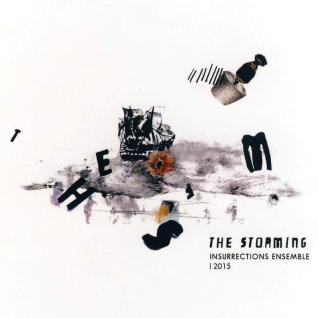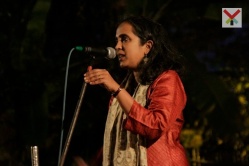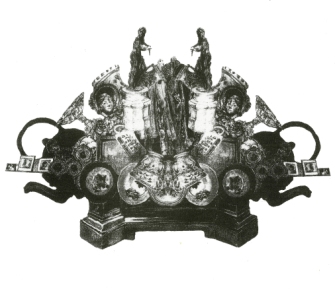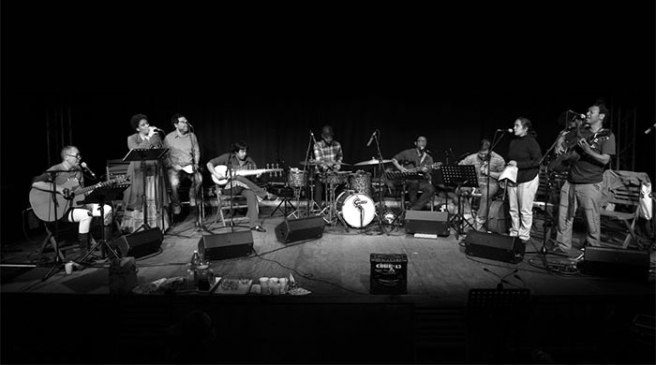“We cannot keep digressing and hiding behind the truth, saying ‘It’ll work someday’. There’s no such thing. If we have to change things, let’s change them radically now.” – Ray Phiri
You can’t relegate the activism of the late Ray Chikapa Phiri to the past; as the quote above (taken from an interview on 30 May this year, only six weeks before his death) illustrates, he never stopped urging the necessity for change. But it’s sometimes tempting to ask where his successors in that respect are, because we rarely hear or read about them.
That’s the point: much as the present proliferation of media creates the illusion we can access everything in the world, it can obscure as much as it reveals. Today’s South African political music is rarely written about: even when its practitioners are profiled, they are often presented as ‘personalities’, evading the content of their work. If a project has no big commercial impetus behind it, it may not be covered at all. (Those of us schooled with a different view of journalism quaintly believe our task is to inform readers of things they might not otherwise know.)
The music of past protests is often co-opted to shore up and sanitise those in power (Awuleth’uMshini Wam’ anybody?). Employed to comment on current causes (Dubul’ iBhunu), it is prosecuted and proscribed. South African news reporters – who really should know better – write crudely of ‘chanting mobs’. New songs, such as the woke anthem, ( https://www.dailymaverick.co.za/opinionista/2017-06-28-tracing-the-roots-of-the-decolonised-anthem/) receive minimal coverage. But new music demanding change is being written and sung, on the streets and on stages.

One recent example of the latter can be found on the CD Insurrections III: The Storming (http://www.sahistory.org.za/article/insurrections-storming ). The Insurrections project began in 2011, the brainchild of South African poet Ari Sitas, musicians Sazi Dlamini and Neo Muyanga, and Indian scholar and vocal artist Sumangala Damarodan (http://www.thehindu.com/features/friday-review/singing-an-archive/article7205671.ece ), to explore the intersections of Indian and South African music and writing. Two CDs followed: Insurrections (http://www.sahistory.org.za/collection/28511 ) and Insurrections II, The Gathering (https://shop.sahistory.org.za/product/cd/insurrections-ii-gathering ).

Now a third has appeared. Among its 14 participants, Sitas, Dlamini and Damarodan, New Music composer Jurgen Brauninger, singer Tina Schouw and bassist Bryden Bolton remain, joined for this outing by guitarist Reza Khota, poets Vivek Narayanan, Malika Ndlovu, Sabitha T.P. and more
The Storming is a loose, imaginative re-visioning of Shakespeare’s Tempest and Aimé Césaire’s 1969 Une Tempête (https://en.wikipedia.org/wiki/Une_Tempête) for the age of neocolonialism. As well as being a startling piece of magical (sur)realism, The Tempest is a classic drama of colonialism, centred on the struggle between the colonising wizard, Duke Prospero, and the indigenous rebel, Caliban. Shakespeare was writing for an audience of colonisers in the age of colonisation; on his stage, Caliban was a monster spawned by the New World. Césaire, by contrast, aimed to interrogate and change both colonisers and colonised. His was the era of anticolonial struggle and his Caliban was a Caribbean hero: “Call me X. That would be best; like a man without a name. Or, to be more precise, a man whose name has been stolen.”

And now here we are in the postcolonial/neocolonial era. In the Storming playbook, Caliban is now Calibana (and the patriarchal nature of colonialism runs through the text). The dawn of liberation brings a glittering consumerist culture for a few and the task of reconstructing shattered souls and societies for the rest, who still live in want. Calibana continues to urge: “Let us dream of you, forbidden landscape…bring on the storm.”
The Storming, just out, is presented as an audio CD (a recording of the 2015 performance at the District Six Homecoming Centre) set in what’s described as a hardback ‘catalogue’ containing credits, text, and, where relevant, translations (some song texts are in Malayalam) interleaved with artwork from Stephane Conradie.

It’s a visually beautiful presentation, but it does not make for the easiest listen. At least on first hearing, it’s useful to follow the sound by reading the text, requiring free hands and a formal sit-down – not the way most people approach music on CD. It forces the kind of attention we apply in the theatre, and that’s no bad thing: Sitas and the others are all powerful poets, and the text alone merits attention for that. But, against those virtues, we are forced to become lone listeners and lose the communal experience of being in an audience and the interplay between the text and its embodied expressions on stage: the changing moods of lighting; movement; and expression. Budget is always a constraint in publishing projects like these, but a DVD could have preserved some of that.
If that is lost, however, multiple, rich layers of interaction remain. In the book, text plays off against Conradie’s often intensely detailed images. The two experiences of colonial theft differ in detail – teak and rubber in one place; mining and minerals in the other – but speak powerfully to one another through their shared human impact.
And, of course, words interact with music, and musics born in different genres or geographies communicate and mutate. There’s a magic moment on Insurrections’ previous album, The Gathering, where the track Migrant’s Lament presents as a song of global migration: Alfred Qabula’s lyric, sung in an isiZulu vocal idiom, simultaneously asserting its own identity and flowing seamlessly along a raga pattern. On Storming, where the music is called on to underpin, underline (and subvert) a play-text, those kinds of mutations and conversations abound, but in more fragmented forms as the drama demands.

It’s not the kind of recording where songs and solos demand attention for themselves, but there are multiple powerful moments that may make you stop reading to simply listen, such as Damarodan’s song as Ariela Whilst You Were Sleeping, with – I’m guessing, as solos are not credited – Khota on guitar. And although the vision of the drama is bleak and dystopian, it is never hopeless. There’s a triumphant conclusion in Calibana’s militant demand to “dream of forbidden landscapes… (we thought we’d almost known you once)” – surging forward over maskandi guitars; enacting collective protest past, present and to come…

